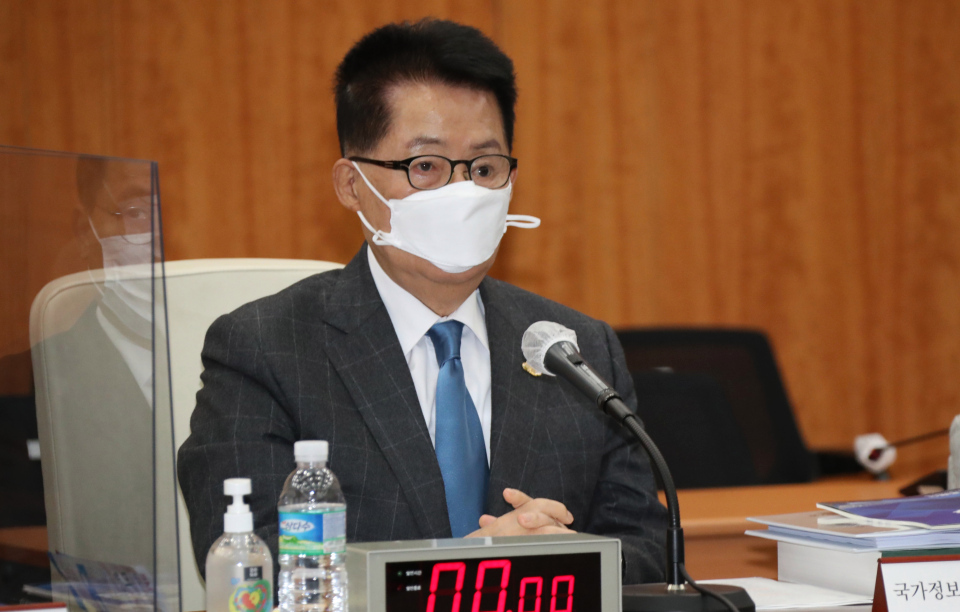 |
National Intelligence Service (NIS) chief Park Jie-won attends a parliamentary audit session at the NIS headquarters last Tuesday. (Yonhap) |
TOKYO/SEOUL -- South Korea's National Intelligence Service Director Park Jie-won met with Japanese Prime Minister Yoshihide Suga in Tokyo on Tuesday, a senior Japanese official said, amid strained relations between the two countries over wartime history and trade.
Tokyo's Chief Cabinet Secretary Katsunobu Kato told a regular press briefing that Park paid a courtesy call on Suga, in the first high-level meeting between the two countries since Suga took office in September after his predecessor, Shinzo Abe, resigned due to deteriorating health.
Their meeting came amid expectation that the incoming administration of US President-elect Joe Biden might want Washington's two Asian allies to patch things up as it eyes a closer-knit alliance network for regional security.
Park and Suga were expected to discuss the long-simmering issue of Japan's wartime forced labor, as well as Seoul's efforts to host a trilateral summit with China and Japan next month and seize on next year's Tokyo Olympics to reengage with Pyongyang.
Seoul and Tokyo remain far apart over the forced labor issue, amid fears that victims' move to sell off seized assets in South Korea of Japanese firms to get compensation could exacerbate tensions between the countries.
A legal process to liquidate the assets took a step further Tuesday, as a local court's public notice to Mitsubishi Heavy Industries regarding the process took effect with no diplomatic solution in sight.
Seoul honors the 2018 Supreme Court rulings that ordered Japanese firms to compensate victims of forced labor during Japan's 1910-45 colonization of the Korean Peninsula.
But Tokyo argues that all reparation issues stemming from its colonial rule were settled under a 1965 treaty that normalized bilateral relations.
The historical row has darkened the prospects for their envisioned trilateral summit with China, as Suga reportedly expressed his intent not to join the gathering unless South Korea promises not to liquidate the assets of Japanese firms to compensate forced labor victims.
Despite the persistent tussle between Seoul and Tokyo, calls have been growing for them to move beyond their historical animus, as the incoming Biden government, intent on shoring up multilateralism to strengthen America's global leadership, is expected to balk at a fissure in its regional alliance network.
Seoul's spy chief, keen on creating momentum to reengage with the North, was also expected to use his talks with Suga to enlist Tokyo's cooperation in bringing the North back to dialogue on the occasion of next year's Olympic Games.
Should the North's athletic delegation participate in the Olympics, the international sporting event could set the stage for diplomatic engagement with North Korean officials amid a protracted deadlock in nuclear talks between Washington and Pyongyang.
Park made an unannounced visit to Tokyo on Sunday.
On Monday, Park reportedly met Japan's National Security Secretariat Secretary General Shigeru Kitamura and Cabinet Intelligence Director Hiroaki Takizawa. (Yonhap)





![[Exclusive] Hyundai Mobis eyes closer ties with BYD](http://res.heraldm.com/phpwas/restmb_idxmake.php?idx=644&simg=/content/image/2024/11/25/20241125050044_0.jpg)

![[Herald Review] 'Gangnam B-Side' combines social realism with masterful suspense, performance](http://res.heraldm.com/phpwas/restmb_idxmake.php?idx=644&simg=/content/image/2024/11/25/20241125050072_0.jpg)
